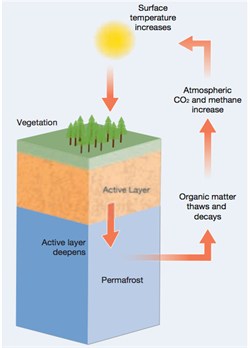How is the carbon cycle affected by global warming?
1 Answer
Increased temperatures affect the carbon cycle by lowering the amount of CO2 absorbed by oceans, melting permafrost which exposes the land underneath which then releases CO2 and CH4, and other
Explanation:
The carbon cycle describes how carbon moves and is transformed in the world. Global warming refers to increasing average global temperatures due to increases in greenhouse gases, such as carbon dioxide or CO2, in the atmosphere. Another important GHG is methane, CH4, is also increasing in the atmosphere.
Thus, the carbon cycle and global warming are intricately connected, as increasing carbon in the atmosphere means there is less carbon elsewhere in the cycle. Several feedback effects can be expected with higher temperatures:
- Warmer oceans are less able to absorb CO2.
- Higher temperatures also means melting permafrost, which will release carbon dioxide and methane into the atmosphere.

- In areas with low precipitation, increased temperatures may increase the risk for forest fires, which would then release more carbon from the plant life into the atmosphere.
- Increasing atmospheric CO2 concentrations is thought to have a direct effect on peat forests, causing the bogs to release more CO2 (see here).
 )
)
Global warming will impact the carbon cycle in multiple ways, not all of which are fully understood.
See related Socratic content for more information:
How is carbon related to global warming?
How can the carbon cycle affect our planet?
How does carbon affect climate change?

